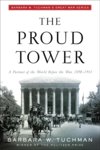

“The Proud Tower: A Portrait of the World Before the War, 1890-1914” was a bestseller when it was published by historian Barbara Tuchman in 1966. Drawn from a collection of lengthy essays she had written for various magazines, it is a page-burning story of a world blundering toward collapse in what we now call “the Golden Age,” though no one who lived through it thought of it that way at the time.
“A phenomenon of such extended malignance as the Great War does not come out of a Golden Age,” Tuchman wrote.
The book takes its title from the 1845 Edgar Allan Poe poem “The City in the Sea” — “While from a proud tower in the town/Death looks gigantically down.”
“The Great War of 1914-18 lies like a band of scorched earth dividing that time from ours,” Tuchman wrote. “In wiping out so many lives which would have been operative on the years that followed, in destroying beliefs, changing ideas, and leaving incurable wounds of disillusion, it created a physical as well as psychological gulf between two epochs. This book is an attempt to discover the quality of the world from which the Great War came.”
And that’s just the second paragraph.
Like her more famous 1978 portrait of 14th century France, “A Distant Mirror,” Tuchman here too finds parallels in a bygone age that illuminate our own despite the esoteric subject. It’s as if she deliberately chose the most obscure pages of history to prove that modern society is just as vulnerable to the same kind of corrupting human foibles as that bygone age, and that we should guard against it, whether we live in the 1960s or 2020s.
The book is divided into eight chapters, each describing political and social developments in a different country, stretching from the United States across Europe to Russia, and the personalities who drove them. Reading it is something like attending a family reunion with relatives one has never met, resurrecting forgotten history lessons like buried memories (the Haymarket trial, the American invasion of the Philippines, that eccentric introvert Alfred Nobel), coupled with the unnerving sensation of having one’s own passions and antipathies echoed by people now dead for a century.
We step back through time to the era of the landed gentry and patrician parliamentarians of Great Britain at the zenith of her empire, to the fight for universal suffrage for (white) male voters and the eight-hour day on the continent, to the swelling imperialism of the United States, to a decade of assassination and bomb-throwing as a young intellectual movement called Anarchism is hijacked by the impoverished refugees of an eternal underclass who equate lack of government with freedom.
Presidential candidate Theodore Roosevelt publicly calls for the summary execution of socialists and trade unionists, including his opponent Eugene V. Debs. The Czar who freed the serfs is murdered and all thought of further reform in Russia disappears. A nobody French artillery officer, Alfred Dreyfus, is framed for espionage and sent to Devil’s Island, only to be released after the revelation of the corruption and anti-Semitism that sent him there destroys the government. World-weary diplomats establish rules for international arbitration at The Hague, with the certainty that modern war is obsolete. The premiere of Igor Stravinsky’s ballet, “The Rite of Spring,” in 1913 is so radically different from anything that came before, the white-tied gentlemen and elegant ladies of the audience erupt in riot. The first socialist leader of France is shot in the back in a Paris café by a French nationalist and the next day, Aug. 1, 1914, France and Germany mobilize for war.
Critics in 1966 and since have faulted Tuchman for a broad embrace that lacks analysis of the behavior of the Great Nations that led to the Great War. But she admits directly in her preface that while that was her intention at the start, the facts took her elsewhere.
“The Grosse Politik approach has been used up. Besides, it is misleading because it allows us to rest on the easy illusion that it is ‘they,’ the naughty statesmen, who are always responsible for war while ‘we,’ the innocent people, are merely led. That impression is a mistake.”
Earnest if intimidated readers might justly ask, Could we not find something less intense and arcane to pass the lonely days of our pandemic?
The answer is No; we can hardly do better than to open this compelling and insightful tome, of a kind and quality increasingly rare, and gaze not only into our past, but into ourselves.
UNDERWRITTEN BY THE FUND FOR NONPROFIT NEWS (NEWSMATCH) AT THE MIAMI FOUNDATION, THE ANGEL GUILD, ADVERTISERS, DONORS AND PEOPLE WHO SUPPORT INDEPENDENT, NONPROFIT LOCAL NEWS